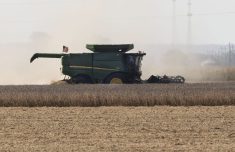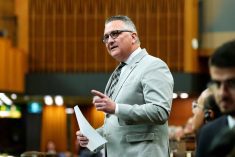Saskatchewan Conservative MPs went before a House of Commons committee yesterday to argue that an electoral boundaries commission proposal to divide the province into urban and rural ridings is wrong-headed.
For Yorkton-Melville MP Garry Breitkreuz, the central issue is the agricultural voice.
“We can’t water down that voice and now we have 14 Saskatchewan MPs with rural constituents and then we would have five fewer,” he said after the committee meeting.
And the government intention to add 30 more urban and suburban seats from Ontario, Alberta, British Columbia and Quebec to the House of Commons for the 2015 election makes it all more crucial, said the veteran MP.
Read Also

Alberta harvest wrapping up: report
Harvest operations advanced to 96 per cent complete in Alberta as of Oct. 7, with only a few late-seeded cereal and canola fields remaining, according to the latest provincial crop report.
“The agriculture voice has to be heard and in Saskatchewan, it has to be well represented,” Breitkreuz said in an interview.
Opposition MPs have argued the Conservative objections are based on the fear that five strictly urban ridings in Saskatoon and Regina could end the Conservative stranglehold on 13 of the province’s 14 seats and offer an opportunity to the NDP to pick up their first seats since 2000.
Liberal Ralph Goodale, the province’s only opposition MP, appeared beside the Conservative MPs at the Commons committee on procedure and House affairs to argue that the proposal for some strictly urban seats reflects the growth of Saskatchewan’s cities.
Seventy-five percent of Saskatchewan residents live in urban centres, he said.
“Yet not one of the 14 ridings is uniquely urban.”
Agriculture minister Gerry Ritz, MP for Battlefords-Lloydminster, argued the sprawling rural ridings that result from carving out five strictly urban seats are unwieldy and often will force voters to travel long distances to vote or to see their MP.
“The biggest concern I have is growing voter apathy.”
MP David Anderson argued that the electoral boundaries commission majority was swayed by the opinions of political scientists and ignored overwhelming feedback from Saskatchewan residents that they preferred to keep the existing urban-rural mixed seats around the major cities.
“There is a failure to understand Saskatchewan’s communities of interest.”
In an unprecedented split vote, the three-member Saskatchewan electoral boundaries commission majority recommended the province’s 14 seats that now are a rural or rural-urban mix be transformed for the 2015 election into five urban ridings in Saskatoon and Regina, three mixed urban-rural ridings in those cities and six large rural ridings.
David Marit, president of the Saskatchewan Association of Rural Municipalities and a member of the commission, filed a minority report arguing against the majority opinion and the idea of urban seats.
The Conservatives, who paid for automated telephone calls in the province to criticize the report, are asking the Commons committee to send the report back to the commission to be reconsidered.
The committee likely will make its decision next month.
















